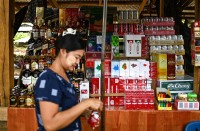Just one in five women in Europe are aware that alcohol is a risk factor for developing breast cancer, a “major” health concern in the region, the World Health Organization warned Friday.
“Only 21 percent of women across 14 European countries were aware of the connection between alcohol consumption and the risk of developing breast cancer,” the European branch of the WHO said in a statement, noting that awareness was even lower among men.
“Just 10 percent of the men surveyed knew of this link.”
The WHO Europe comprises 53 countries and includes Central Asia.
Some 600,000 cases of breast cancer were reported in Europe in 2022.
The WHO did not provide its own data on how many of those cases were alcohol-related.
But it cited 2020 data from the International Agency for Research on Cancer, which showed that of 575,917 new breast cancer cases, 39,248 were alcohol-attributable, or around seven percent.
“The role of alcohol as a preventable risk factor for breast cancer is critical,” the WHO said.
For women in Europe, breast cancer is “the primary cancer caused by alcohol, making up 66 percent of all cases of alcohol-attributable cancers,” it said.
Alcohol consumption affects levels of oestrogen, which plays a significant role in the development and progression of many breast cancers.
Even relatively low levels of alcohol consumption can contribute to the risk of developing breast cancer, the agency warned.
“More than half of all breast cancer cases attributable to alcohol in Europe are not due to heavy drinking, and about one third of new cases every year are due to drinking the equivalent of up to two small glasses of wine per day.”
The WHO called for new national policies to bring about a change in drinking habits across Europe, noting that there have been “no changes in alcohol consumption per capita in the European Union since 2010”.
Breast cancer is the second-most detected cancer, with 2.3 million cases worldwide in 2022, according to the WHO.
The 14 countries included in the European study were Austria, Belgium, Estonia, France, Germany, Ireland, Latvia, Lithuania, Norway, the Netherlands, Portugal, Slovenia, Spain and Sweden.







